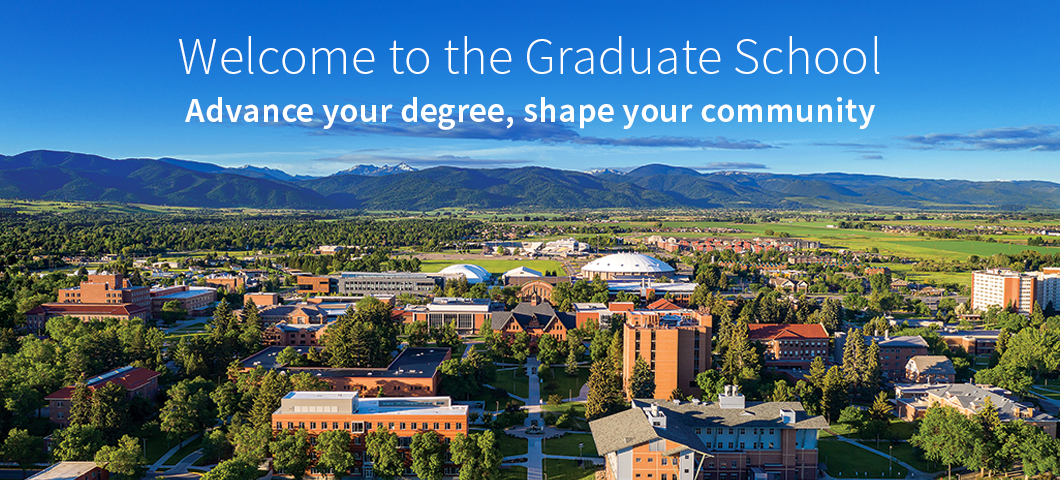Start your new adventure here:
Are you applying for grad school?
Read about the key components that make up a successful application:
Attend an online drop-in session for more information:
These recurrent sessions are meant to be a dedicated space for prospective students to ask questions related to the application process for the Graduate School at Montana State University and other related topics (i.e. tips on letter of purpose, how to look for a potential advisor, etc.).
The sessions will be held every Tuesday at 2 p.m. and Thursdays at 9 a.m. (MDT). Please check this time zone converter if you'll join us from other states/countries: https://www.timeanddate.com/worldclock/converter.html?iso=20240227T182800&p1=3754
Follow this link to join the Tuesday sessions. Follow this link to join the Thursday sessions.
Statement of Purpose
- What are your long-term goals (after Graduate School)?
- Why are you passionate and interested in these goals?
- Tell the story of where you are going
- How your experiences have brought you to this moment, how this graduate program will
propel
you on your way. - This is personal, but not too personal.
- If there is something you need to explain (terrible grades your freshman year that bring down your GPA), get it out in the air, but demonstrate current momentum.
- How your experiences have brought you to this moment, how this graduate program will
propel
- Know your audience.
- Usually a committee of faculty.
They want to know that you will contribute to the field and finish your program. - Know the constraints/parameters for the school/program –
- Do graduate students teach/have teaching assistantships… everyone or just some?
- Are graduate students supported by faculty or institutional grants?
- Do graduate students travel for research or fieldwork?
- Articulate connections to faculty work and university strengths.
- Revise with the knowledge of political theater inherent in faculty committee meetings.
- Usually a committee of faculty.
Do all of this in 1-2 pages
Get feedback from a writer (friend, professor only if it is interesting as a piece
of writing).
Try a reverse outline If you get stuck, summarize each sentence in 1 or 2 words. Does
it still
flow?
Funding
- Most students receive an assistantship, teaching, or research (or GSA).
- Often includes tuition and some health coverage.
Occasionally student fees. - Assistantships are almost always apart of the offer for research degrees (see program website to be sure). Here are the doctoral programs at MSU that usually provide funding: https://www.montana.edu/academics/graduate
- Things to consider when comparing offers:
1. Multi-year? If not, ask.
2. Health coverage (Quality of plan). MSU offers Health Coverage to students.
3. Student fees Included or not? Graduate Student fees at MSU: https://www.montana.edu/ubs/studentaccounts/TuitionFeeCharts/2023Fall-2024Spring/tuition.html
4. Student Union
5. Cost of living https://livingwage.mit.edu/
- FAFSA and student loans.
- Work with schools’ Financial Aid Office. Financial Aid for MSU: https://www.montana.edu/financialaid/
- International students can use Prodigy Finance.
- Check for additional scholarship opportunities at that school. Funding and Fellowships for grad students at MSU.
Secure an Advisor
- Some programs and/or schools may require you to secure an advisor prior to applying.
- You should research the program and faculty that work within the department.
- Choose programs that closely align with your research ideas, or if it is specified
contact the
ones who have funding available. - Email communication should be personalized to each faculty, why you’re interested
in them,
how can they help you be successful, and a little background info on yourself. - You should follow up with these faculty if you haven’t heard back, either follow-up
emails or
contacting the department.
Letters of Recommendation
- Choose a recommender who can speak to your academic or professional abilities.
- They should speak to how things you have done have prepared you for the graduate.
program and why they feel you would be successful. - Make sure that your recommender knows the program you are applying to and reasons
why
you want to apply/attend. - A recommender should be a previous faculty advisor/professor, a work supervisor, or
a
mentor. - Do not ask for a letter from a friend or family member.
- Letters should usually be on letterhead from the university or business and about
a page in
length single spaced. - Some schools require a recommender form as well, so make sure they are prepared to
do
both.
International Students
Every university should have an international policy on applying as an international student.
Within the policy, review the minimum scores required for that university and see what English exams are considered (i.e., TOEFL, IELTS, etc.). Some universities still have entrance exams and Graduate Records Exams (GRE) requirements (MSU does not have either).
The policy should go over how transcripts are received and what is acceptable, whether they need to be translated and/or transcribed, etc. Below is a link to the MSU International applicant page where you can find information on applying to MSU: http://catalog.montana.edu/graduate/policiestext-admissions/index.html#1.4
When to apply
Usually undergrads consider grad school in their third year. We encourage you to review and study programs you wish to earn an advanced degree in, as well as pepare application requirements. In your final year of undergrad is when you should apply. Be aware of program deadlines. If you have taken in between your bachelors degree and advanced degree, please review the program and deadlines, then apply whe you are ready. Here are the graduate programs offered at MSU: https://www.montana.edu/academics/graduate

